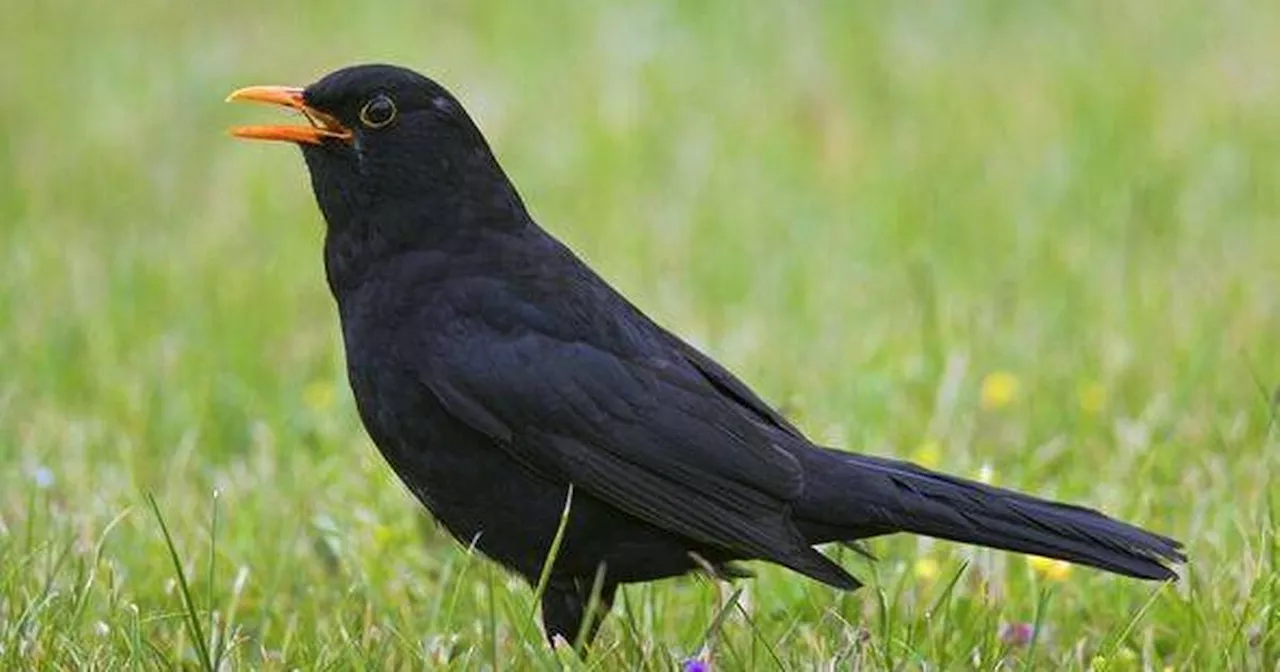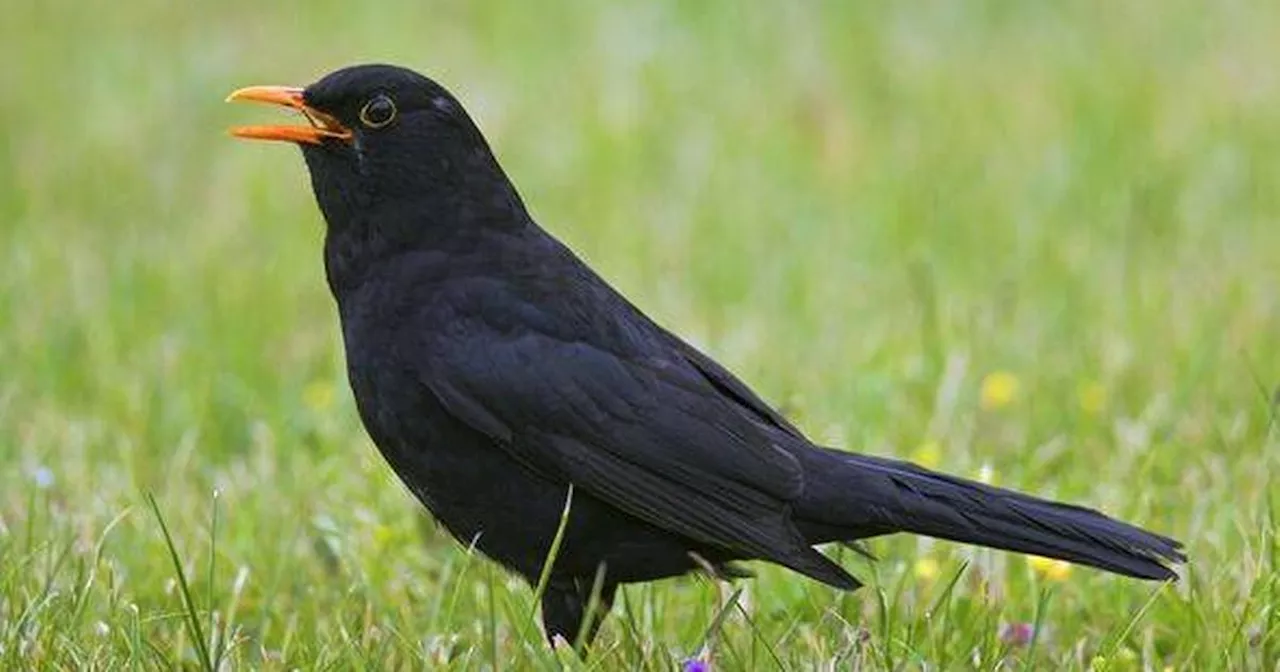A new virus called Usutu is threatening the blackbird population in the UK. Birdwatchers have reported seeing fewer blackbirds in their gardens, particularly in London, since 2020. The virus, which is spread by mosquitoes, can be fatal to blackbirds.
Garden owners who spot blackbirds this winter are being encouraged to provide food for them and report any issues, due to a new virus threatening their population. Blackbirds, one of the most common bird species in the UK with an estimated six million breeding pairs, remain in the country during winter instead of migrating, making it crucial for them to find food during the harsh months. However, a new threat has emerged in recent years - the Usutu virus.
The British Trust for Ornithology has warned that this mosquito-borne virus, which can be fatal to blackbirds, is causing a decline in their numbers. The Trust said: 'Blackbirds are a common bird in gardens across the UK, from rural areas to the hearts of cities. However, in recent years and particularly since 2020, birdwatchers have reported fewer birds being seen in their gardens, especially in London. 'This recent decline has been linked to the appearance of Usutu virus, a new mosquito-borne virus in the UK which is often fatal to blackbirds. 'It was first detected in the UK in London in the summer of 2020, and appears to have since started to spread further in southern Britain. It is prevalent on the near-Continent and its spread has been linked to climate change, which has benefited the mosquitoes which spread the virus,' reports the Express. The Trust is keen to understand if the same decrease in blackbird populations recorded in London is happening elsewhere in the UK. They are appealing for people with gardens to participate in a survey to monitor blackbird numbers when it reopens in 2025 - more information can be found here. For now, experts are encouraging individuals to assist blackbirds by providing food and ensuring they have enough to eat. The Woodland Trust states: 'Common and widespread across the UK, the blackbird population is currently stable, although it has seen periods of decline in the past. 'One of the biggest threats is lack of food availability, particularly when the weather is dry. Leaving mealworms and ground feeder mix out on bird tables and planting bushes that attract caterpillars to your garden are great ways to help blackbirds
BLACKBIRD VIRUS POPULATION DECLINE MOSQUITOES CLIMATE CHANGE
United Kingdom Latest News, United Kingdom Headlines
Similar News:You can also read news stories similar to this one that we have collected from other news sources.
 Usutu Virus Threatens Blackbird PopulationA new mosquito-borne virus, Usutu, is causing a decline in blackbird populations across the UK, particularly in London. The British Trust for Ornithology is urging people with gardens to provide food for blackbirds and report any sightings.
Usutu Virus Threatens Blackbird PopulationA new mosquito-borne virus, Usutu, is causing a decline in blackbird populations across the UK, particularly in London. The British Trust for Ornithology is urging people with gardens to provide food for blackbirds and report any sightings.
Read more »
 Structural Sexism Linked to Faster Memory Decline in Older WomenA new study from Columbia University reveals that women born in states with greater structural sexism experience more rapid cognitive decline as they age.
Structural Sexism Linked to Faster Memory Decline in Older WomenA new study from Columbia University reveals that women born in states with greater structural sexism experience more rapid cognitive decline as they age.
Read more »
 Antibiotics Not Linked to Cognitive Decline in Older AdultsA new study published in Neurology® finds that antibiotic use in healthy older adults is not associated with an increased risk of cognitive impairment or dementia.
Antibiotics Not Linked to Cognitive Decline in Older AdultsA new study published in Neurology® finds that antibiotic use in healthy older adults is not associated with an increased risk of cognitive impairment or dementia.
Read more »
 Multimorbidity Linked to Increased Kidney Function Decline in Older AdultsA new study published in the Journal of the American Geriatrics Society reveals a strong association between multiple chronic conditions and a heightened risk of kidney function decline in older adults.
Multimorbidity Linked to Increased Kidney Function Decline in Older AdultsA new study published in the Journal of the American Geriatrics Society reveals a strong association between multiple chronic conditions and a heightened risk of kidney function decline in older adults.
Read more »
 Neuronal Activity Linked to Mitochondrial Function: New Insights into Age-Related Cognitive DeclineResearch in mice reveals a novel mechanism connecting neuronal activity and mitochondrial function, offering potential for treating age-related cognitive decline.
Neuronal Activity Linked to Mitochondrial Function: New Insights into Age-Related Cognitive DeclineResearch in mice reveals a novel mechanism connecting neuronal activity and mitochondrial function, offering potential for treating age-related cognitive decline.
Read more »
 Mediterranean and DASH Diets Linked to Slower Cognitive DeclineA new study reveals that adherence to the Mediterranean and DASH diets is associated with a slower rate of cognitive decline over a six-year period. The study, which analyzed data from over 6,000 participants, suggests that these dietary patterns contribute to better cognitive function in older adults.
Mediterranean and DASH Diets Linked to Slower Cognitive DeclineA new study reveals that adherence to the Mediterranean and DASH diets is associated with a slower rate of cognitive decline over a six-year period. The study, which analyzed data from over 6,000 participants, suggests that these dietary patterns contribute to better cognitive function in older adults.
Read more »
